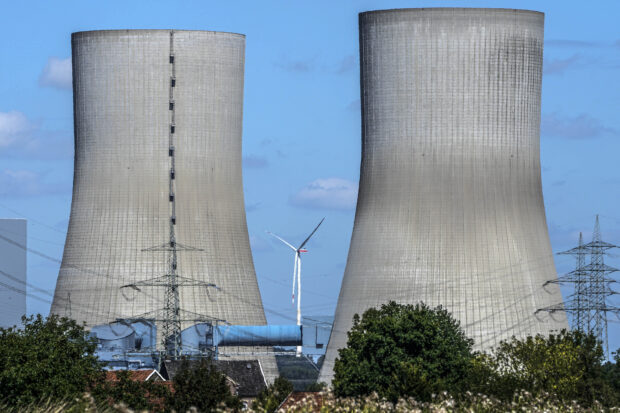A wind turbine is seen behind the shut down coal-fired power plant Westfalen of RWE Generation SE is seen in Hamm, Germany, on Aug. 10, 2023. (AP Photo/Martin Meissner, File)
ESSEN, Germany — Germany, once hailed as an economic powerhouse, is now facing challenges as it becomes the worst-performing major developed economy in the world. The International Monetary Fund and European Union expect Germany’s economy to shrink this year, following Russia’s invasion of Ukraine and the loss of cheap natural gas, which has hit the country’s energy-intensive industries. This sudden decline has prompted criticism, concern, and debate about the nation’s future. Christian Kullmann, CEO of major German chemical company Evonik Industries AG, warns that Germany risks “deindustrialization” as high energy costs and government inaction on chronic issues could lead to the relocation of factories and high-paying jobs. The once-thriving Ruhr Valley industrial region, known for its coal mines and metal plants, now serves as a symbol of Germany’s energy transition, with wind turbines and green spaces replacing smokestacks and waste heaps.
Germany’s reliance on cheap Russian natural gas to power its factories has been severely disrupted by the conflict in Ukraine, causing significant damage to the country’s economy. To cope with the crisis, the German government has requested Evonik to keep its coal-fired power plant operational until a more sustainable solution is found. The company is transitioning to two gas-fired generators, which will eventually run on hydrogen, as part of its plan to become carbon neutral by 2030.
One proposed solution to Germany’s energy woes is the implementation of a government-funded cap on industrial electricity prices during the transition to renewable energy. However, this idea has faced resistance from Chancellor Olaf Scholz and the pro-business coalition partner. Critics argue that such a policy would only prolong reliance on fossil fuels. Kullmann, on the other hand, supports the price cap and believes that high energy costs resulted from misguided political decisions, emphasizing that German industry and workers should not bear the burden.
Not only has Germany faced energy challenges, but it has also been affected by a slowdown in its key trade partner China. These external shocks have exposed underlying issues that were previously overlooked during Germany’s years of success. These include the lagging adoption of digital technology in government and business, delays in infrastructure investments, a controversial decision to shut down nuclear power plants, a shortage of skilled labor, and overreliance on Russian gas imports.
Germany’s transition to clean energy has been marred by bureaucracy and resistance from local communities. Stringent spacing limits have limited the construction of wind turbines, and an electrical line bringing wind power to the south of the country has faced delays due to political opposition. The massive clean energy subsidies offered by the Biden administration to companies investing in the United States have sparked envy and concern that Germany is falling behind.
In response to the energy price shock, energy-intensive companies are finding alternative solutions. For example, Drewsen Spezialpapiere has purchased wind turbines to cover a quarter of its electricity demand, and Schott AG has experimented with using emissions-free hydrogen as a substitute for gas in its glass production.
Chancellor Scholz has called for an “Germany tempo” in the energy transition, referencing the urgency displayed in setting up floating natural gas terminals to replace lost Russian gas. However, disagreements among the coalition government over the energy price cap and a law banning new gas furnaces have frustrated business leaders. Kullmann dismisses recent government proposals as insufficient, calling for more pragmatism and prompt decision-making.
Germany’s previous economic success has led to complacency and misguided decisions, such as the decision to exit nuclear energy and rely on ample natural gas supplies from Russia. Holger Schmieding, chief economist at Berenberg bank, believes that ending uncertainties over energy prices through a price cap would be a crucial step to restore confidence and facilitate investment decisions. Germany still has the capacity to make necessary changes, but prompt action is required to avoid further setbacks.
Denial of responsibility! Vigour Times is an automatic aggregator of Global media. In each content, the hyperlink to the primary source is specified. All trademarks belong to their rightful owners, and all materials to their authors. For any complaint, please reach us at – [email protected]. We will take necessary action within 24 hours.


